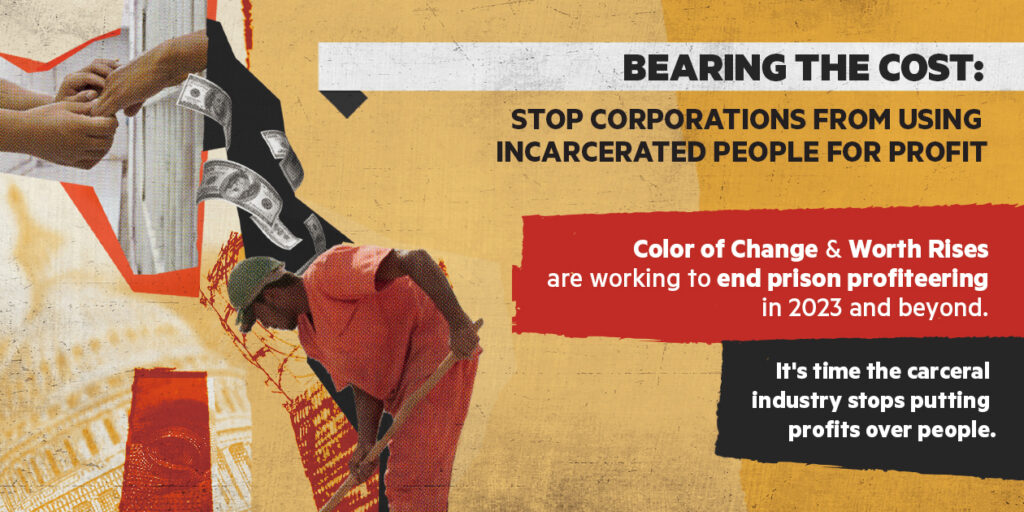Corporations Profiting Off Those in Prison Put Families in Peril

By Liz Courquet-Lesaulnier
Ever heard that old saying “crime doesn’t pay”? The American predatory prison services industry knows otherwise.
Private corporations, inflating prices on everything from basic hygiene products to health care, rake in $80 billion in profits every year. That money lines the pockets of CEOs and Wall Street shareholders, most of whom are white. But it’s earned by exploiting incarcerated people and their families — a disproportionate number of whom are Black.
While some believe the myth that incarcerated people get “three hots and a cot” – meals and a bed – for free, in reality they often have to pay out of pocket to get enough food to eat. The price gouging at the commissary pours money into the coffers of the more than 4,000 corporations that have million-dollar service contracts with state and federal prisons.
Hidden behind prison walls, this predatory economy forces incarcerated people to rely on friends and family members to send them money — and corporate profiteers charge fees for that, too.
A new Color Of Change report, “Policy Blueprint for Ending Carceral Profiteering,” defines the problem and lays out policies to correct it. Released Feb. 6, the report calls on President Joe Biden, Congress and the U.S. Justice Department to end the exploitation, which puts Black families in financial peril and drains resources from Black communities.
“Every year, politicians choose to protect corporations as they gouge, fleece and scam incarcerated people and their families,” said Rashad Robinson, Color Of Change president. Allowing the abuse, he said, “enables corporations like Securus, Aramark, Corizon and JPAY to use the criminal justice system as a cash cow, stealing billions of dollars from our communities.”
“People ask what structural racism is,” Robinson says. “This is it.”
An estimated 1 in 3 families end up in debt trying to ensure their loved ones have access to shampoo, menstrual products, toothbrushes, edible food or regular medical care.
Although most Americans think prisons provide free health care, incarcerated people are charged co-pays for a doctor’s visit — just like folks on the outside. The difference: People working in prison typically earn around 50 cents per day, if they get paid at all.
“If I go to the doctor, I will owe the facility $2,” Louis Dixon, 27, who is incarcerated in Kansas, told The Marshall Project. Dixon used to earn $15 per month cutting grass at the prison – roughly two quarters a day – but he’s currently without a job.
And Dixon needs medical care. Because of lower back issues, he often has pain that “goes down to my buttocks and the back part of my legs. It will get sometimes to the point I can barely walk.”
Like other aspects of the criminal legal system, corporate price gouging behind bars disproportionately hurts Black families. An estimated 63% of Black Americans have had family members in jail or prison, even though Black people are just 13% of the population. And a 2018 report by the Essie Justice Group found that 1 in 2 Black women have an incarcerated loved one.
These women end up working longer hours or taking on side hustles to pay for phone calls and commissary bills, according to the study. That burden takes its toll: Along with causing “extreme psychological distress,” the financial weight of a loved one in the prison system is a “serious obstacle to the financial health and economic agency” of Black women.
The impact is clear: These family members haven’t committed a crime, but predatory corporations are making them pay. But the exploitation doesn’t stop on the outside.
Inside prisons, wage theft is common. According to an American Civil Liberties Union analysis, the average prison job pays 52 cents per hour, but at least six states don’t pay prison laborers anything – even though the work ranges from data entry and telemarketing to physically demanding jobs in food service and prison facilities maintenance.
“You’re a slave — that’s what they tell us,” Jonathan Archille, 29, told The Washington Post in January.
Archille, who is incarcerated in Louisiana, is required by state law to work. Because of good behavior, he is part of a program that allows him to work in a cafe at the Louisiana state capitol, serving lawmakers, among others.
“We don’t get paid and they work us a lot,” Archille said.
And when it comes to buying necessities, marked-up goods are the only option. If Archille wears a hole in his prison-issued socks, and the commissary’s charging $6 for a new pair, there’s no shopping around for a sale.
As for Dixon, he said he’s better off staying in his cell just to avoid behavioral fines the prison invents — $20 a pop for walking on grass, for example, or not having your shirt tucked in.
“That’s how they do it in here,” he said. “They give you money and figure out how to take it back from you.”
Sign Color Of Change’s petition telling the Biden administration to take the steps outlined in the blueprint to stop corporations from profiting off people in prisons and jails.

